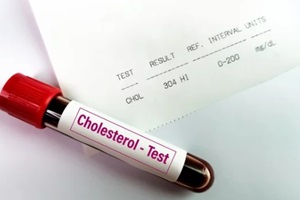 High cholesterol is considered a significant but controllable risk factor for cardiovascular disease. Heart disease is the leading cause of death globally, underscoring the importance of understanding its connection to high cholesterol.
High cholesterol is considered a significant but controllable risk factor for cardiovascular disease. Heart disease is the leading cause of death globally, underscoring the importance of understanding its connection to high cholesterol.
This article will help you understand what cholesterol is, how it relates to heart disease, and what you can do to manage your cholesterol levels.
What Is Cholesterol?
Cholesterol is a wax-like material that travels through your bloodstream. It’s produced naturally by your liver but also comes from foods derived from animals, like meat, eggs, and dairy.
A few different types of cholesterol exist:
- LDL cholesterol is colloquially called “bad” cholesterol because it contributes to plaque building up and narrowing your arteries.
- HDL cholesterol, conversely, is dubbed “good” cholesterol because it assists in eliminating LDL cholesterol from your blood.
- Triglycerides are also fats, but a different type, that travel in your bloodstream and can also increase the risk of cardiac disease.
When you have high LDL cholesterol levels, cholesterol can accumulate in your artery walls over time and form plaque — a thick, hard deposit that can narrow and harden your arteries.
This process is known as atherosclerosis. Restricted blood flow from atherosclerosis can cause serious cardiovascular complications.
High Cholesterol and Cardiovascular Disease: Understanding the Connection
Many studies have conclusively demonstrated that high LDL cholesterol significantly raises the risk of developing cardiovascular disease. According to some of the evidence:
- Having high cholesterol doubles your risk of developing heart disease compared to optimal cholesterol levels.
- Research shows that every 39 mg/dL increase in LDL cholesterol raises your risk of coronary artery disease by about 40%.
- People with additional risk factors such as obesity, high blood pressure, or diabetes have even higher heart disease risk with high LDL cholesterol.
- Patients with familial hypercholesterolemia, a genetic condition causing very high LDL levels, often develop premature heart disease if untreated.
- Populations with naturally lower LDL cholesterol levels, such as hunter-gatherers, have extremely low rates of heart disease.
This compelling evidence demonstrates that high LDL cholesterol plays a pivotal role in the development of atherosclerosis and cardiovascular events such as heart attacks. Maintaining a healthy cholesterol level is essential for cardiac health.
How High Cholesterol Damages Arteries
To fully understand the connection between high cholesterol and heart disease, it’s important to look at what happens inside the arteries when cholesterol levels are elevated.
Arteries are lined by a thin, delicate layer of endothelial cells, creating the endothelium. This innermost lining is in direct contact with the bloodstream.
When LDL cholesterol levels rise, these particles can penetrate the endothelial layer and become trapped within the artery wall.
 Inside the wall, the LDL particles encounter damage from free radicals, becoming oxidized LDL. This triggers an inflammatory response, where immune cells called macrophages enter the artery wall to try to ingest the foreign oxidized LDL.
Inside the wall, the LDL particles encounter damage from free radicals, becoming oxidized LDL. This triggers an inflammatory response, where immune cells called macrophages enter the artery wall to try to ingest the foreign oxidized LDL.
These macrophages become engorged with lipids and transform into foam cells. Clusters of foam cells accumulate to form fatty streaks that appear along the artery lining.
The inflammation cascades further, promoting smooth muscle cell migration and proliferation within the wall.
A fibrous plaque develops over the fatty streak as cellular debris, calcium, and cholesterol crystals build up. This plaque protrudes into the artery lumen, narrowing the passageway and restricting blood flow.
Over time, sustained high LDL cholesterol accelerates this inflammatory process, driving progressive plaque accumulation and atherosclerosis throughout the circulatory system.
Established plaques can suddenly rupture, producing blood clots that fully obstruct arterial blood flow. This leads to acute cardiovascular events such as heart attack or stroke.
Genetic Factors Strengthen the Link
Our genes also demonstrate the close relationship between lifelong high cholesterol levels and heart disease risk.
People born with genetic variants causing elevated LDL cholesterol typically have higher rates of early heart disease.
Conversely, those with genetic mutations leading to lower cholesterol levels have a substantially reduced risk for cardiovascular events — often upwards of 50% lower compared to the general population.
This suggests that the total lifetime exposure to elevated LDL cholesterol drives the atherosclerotic process starting at a young age.
Genetic studies also indicate that even small, incremental reductions in LDL cholesterol over decades can dramatically reduce heart disease risk.
Prevention Through Lifestyle Changes
The good news is that for most people, heart disease is largely preventable through lifestyle changes to avoid high cholesterol levels. Here are some effective strategies:
- Following an eating pattern low in saturated fat, trans fat, and cholesterol can help lower LDL cholesterol levels. Replace saturated fats from red meat and full-fat dairy with healthier mono- and polyunsaturated fats.
- Increasing fiber intake, especially from whole grains, fruits, vegetables, and legumes, can reduce LDL cholesterol levels. Soluble fiber is exceptionally beneficial in reducing cholesterol.
- For overweight or obese individuals, losing weight through calorie reduction and exercise is essential to reduce LDL and raise HDL cholesterol. Even a 10% reduction in body weight can improve cholesterol numbers.
- Aerobic exercise training helps raise HDL levels and improves the overall cholesterol profile, even without significant weight loss.
- Quitting smoking can increase HDL cholesterol while eliminating chemicals that damage arteries.
- Limiting alcohol intake to moderate levels at most avoids large cholesterol increases associated with heavy drinking.
Take Control of Your Cholesterol with Imperial Center Family Medicine
 By understanding the close relationship between high cholesterol and heart disease development, you can take steps to reduce your risk starting today.
By understanding the close relationship between high cholesterol and heart disease development, you can take steps to reduce your risk starting today.
Through healthy lifestyle changes and monitoring your cholesterol numbers, you can keep your heart healthy for years to come.
Speak with your doctor about evaluating your cholesterol levels and creating an individualized prevention plan.
Imperial Center Family Medicine’s expert team specializes in personalized care and advice to help you optimize your cholesterol profile.
Contact us today at 919-873-4437 or online to discuss your heart health and schedule a cholesterol screening.
